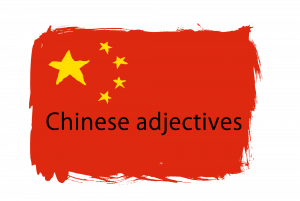Difference between revisions of "Language/Mandarin-chinese/Grammar/Chinese-adjectives"
< Language | Mandarin-chinese | Grammar
Jump to navigation
Jump to search
m (Quick edit) |
|||
| (8 intermediate revisions by 3 users not shown) | |||
| Line 1: | Line 1: | ||
<div | [[File:Chinese adjectives.png|thumb]] | ||
<div class="pg_page_title"> Chinese adjectives </div> | |||
Learning Chinese adjectives is very important, because they are used a lot in everyday conversations. | Learning Chinese adjectives is very important, because they are used a lot in everyday conversations. | ||
| Line 103: | Line 104: | ||
|} | |} | ||
== | ==Shapes== | ||
{| class="wikitable" | {| class="wikitable" | ||
!xíng zhuàng 形状 | !xíng zhuàng 形状 | ||
| Line 267: | Line 268: | ||
|all | |all | ||
|} | |} | ||
== | |||
==Other Lessons== | |||
* [[Language/Mandarin-chinese/Grammar/二-(èr)-versus-两-(liǎng)|二 (èr) versus 两 (liǎng)]] | |||
* [[Language/Mandarin-chinese/Grammar/Questions|Questions]] | |||
* [[Language/Mandarin-chinese/Grammar/Plurals|Plurals]] | |||
* [[Language/Mandarin-chinese/Grammar/Describing-People-with-Suffixes-家-者-师-员-生-手|Describing People with Suffixes 家 者 师 员 生 手]] | |||
* [[Language/Mandarin-chinese/Grammar/Basic-structure-of-a-sentence|Basic structure of a sentence]] | |||
* [[Language/Mandarin-chinese/Grammar/Nouns|Nouns]] | |||
* [[Language/Mandarin-chinese/Grammar/Transition-words|Transition words]] | |||
* [[Language/Mandarin-chinese/Grammar/和-(hé)|和 (hé)]] | |||
* [[Language/Mandarin-chinese/Grammar/Questions-with-不-(bù)|Questions with 不 (bù)]] | |||
* [[Language/Mandarin-chinese/Grammar/How-to-ask-a-question-in-Chinese|How to ask a question in Chinese]] | |||
<span links></span> | |||
Latest revision as of 22:17, 26 March 2023
Chinese adjectives
Learning Chinese adjectives is very important, because they are used a lot in everyday conversations.
Adjectives are words that describe or modify another person or thing in the sentence.
Examples[edit | edit source]
Here are some examples:
| xíng róng cí 形容詞/形容词 | adjective |
|---|---|
| yì kē lǜ sè de shù 一棵綠色的樹/一棵绿色的树 | a green tree |
| yí zuò gāo lóu 一座高樓/一座高楼 | a large building |
| yí gè hěn lǎo de rén 一個很老的人/一个很老的人 | a very old man |
| lǎo hóng fáng zi 老紅房子/老红房子 | the old red house |
| yí gè fēi cháng hǎo de péng you 一個非常好的朋友/一个非常好的朋友 | a very kind friend |
Here is an additional list of vocabulary that can be helpful, and related to the subject: colors, sizes, shapes.
Try to memorize the new words you see and take note of any grammar patterns you have learned.
Colors[edit | edit source]
| yán sè 顏色/颜色 | colors |
|---|---|
| hēi sè 黑色 | black |
| lán sè 藍色/蓝色 | blue |
| zōng sè 棕色 | brown |
| huī sè 灰色 | Grey |
| lǜ sè 綠色/绿色 | green |
| chéng sè 橙色 | orange |
| zǐ sè 紫色 | purple |
| hóng sè 紅色/红色 | red |
| bái sè 白色 | White |
| huáng sè 黃色/黄色 | yellow |
sizes[edit | edit source]
| chǐcùn 尺寸 | sizes |
|---|---|
| dà 大 | big, large |
| shēn 深 | deep |
| cháng 長/长 | long |
| zhǎi 窄 | narrow |
| duǎn 短 | short |
| xiǎo 小 | small |
| hòu 厚 | thick |
| báo; bó 薄 | thin |
| kuān 寛/宽 | large |
Shapes[edit | edit source]
| xíng zhuàng 形状 | forms |
|---|---|
| yuán de, yuán xíng de 圓的,圓形的/圆的,圆形的 | circular |
| zhí de, zhí xiàn de 直的,直線的/直的,直线的 | straight |
| fāng de, fāng xíng de 方的,方形的 | square |
| sān jiǎo de, sān jiǎo xíng de 三角的,三角形的 | triangular |
Tastes[edit | edit source]
| wèi dào 味道 | tastes |
|---|---|
| kǔ 苦 | bitter |
| dàn 淡 | fresh |
| xián 咸 | dirty |
| suān 酸 | sour |
| là 辣 | spicy |
| tián 甜 | sweet |
Qualities[edit | edit source]
| xìng zhì 性質/性质 | qualities |
|---|---|
| huài 壞/坏 | bad |
| gān jìng 干凈/干净 | clean |
| hēi 'àn 黑暗 | dark |
| kùn nán 困難/困难 | difficult |
| āng zāng 骯髒/肮脏 | dirty |
| gān 亁/干 | dry |
| róng yì 容易 | easy |
| kōng 空 | empty |
| áng guì 昂貴/昂贵 | expensive |
| kuài 快 | fast |
| qí guài 奇怪 | strange |
| mǎn 满 | full |
| hǎo 好 | good |
| yìng 硬 | hard |
| zhòng 重 | heavy |
| pián yi 便宜 | cheap |
| qīng 輕/轻 | lightweight |
| dāng dì 當地/当地 | local |
| xīn 新 | new |
| cáo zá 嘈杂 | noisy |
| lǎo 老 | old |
| qiáng dà 強大/强大 | powerful |
| ān jìng 安靜/安静 | calm |
| zhèng què 正確/正确 | correct |
| huǎn màn 緩慢/缓慢 | slow |
| ruǎn 軟/软 | soft |
| hěn 很 | very |
| dī 低 | low |
| cháo shī 潮濕/潮湿 | wet |
| cuò wù 錯誤/错误 | wrong |
| nián qīng 年輕/年轻 | young |
Quantities[edit | edit source]
| shù liàng 數量/数量 | quantities |
|---|---|
| hěn shǎo 很少 | little (number) |
| xǔ duō 許多/许多 | a lot |
| bù fen 部分 | part |
| yì xiē 一些 | some |
| jǐ gè 幾個/几个 | a few |
| suǒ yǒu 所有 | all |
Other Lessons[edit | edit source]
- 二 (èr) versus 两 (liǎng)
- Questions
- Plurals
- Describing People with Suffixes 家 者 师 员 生 手
- Basic structure of a sentence
- Nouns
- Transition words
- 和 (hé)
- Questions with 不 (bù)
- How to ask a question in Chinese
